September 18, 2012 -- Updated 1452 GMT (2252 HKT)
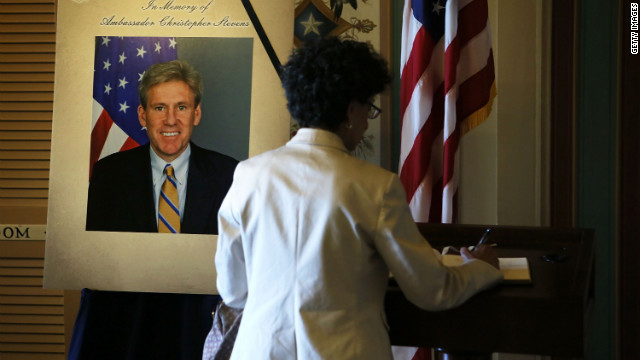
A
woman signs the condolence book for Ambassador J. Christopher Stevens at
the U.S. Capitol September 14, 2012 in Washington, DC. Ambassador
Stevens and three other Americans were killed in an attack on the U.S.
Consulate in Benghazi, Libya on September 11, 2012
STORY HIGHLIGHTS
- NEW: Protests against anti-Islamic video in Indonesia, Thailand, reports say
- Taliban group says Afghanistan suicide attack was in retribution for video
- Al Qaeda urges killing of U.S. government representatives across Muslim lands
- A U.S. Muslim leader says there should be "no reaction to such an insignificant production"
"We encourage all Muslims
to continue to demonstrate and escalate their protests ... and to kill
their (American) ambassadors and representatives or to expel them to
cleanse our land from their wickedness," said the statement from al
Qaeda in the Islamic Maghreb.
The group called last
week's killing of Stevens, the U.S. ambassador to Libya, "the best gift
you (can) give to his arrogant and unjust administration."
The video, "The Innocence
of Muslims," is a low-budget, amateurish 14-minute movie trailer
produced privately in the United States and posted on YouTube. The clip
mocks the Prophet Mohammed as a womanizer, child molester and killer.
Islam forbids any depictions of Mohammed, and blasphemy is taboo among many in the Muslim world.
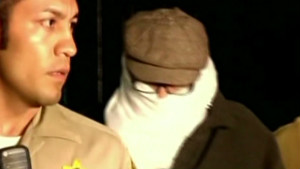
The man behind anti-Islamic film
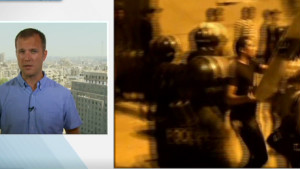
Egypt cracks down on protesters
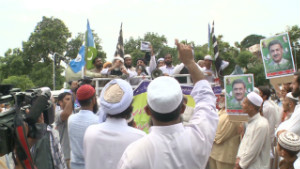
Peaceful protests in Pakistan
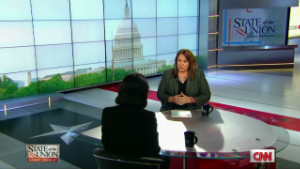
Rice on the anti-American protests abroad
The video was relatively
obscure until September 11 when rioters seizing on it breached the U.S.
Embassy in Cairo. Protesters also attacked the U.S. Consulate in
Benghazi, Libya, killing Stevens and three other Americans.
Although Washington has
made it clear it did not sanction the film, a wave of protests since
then has rippled from Morocco to Malaysia, spurring U.S. officials to
increase security at diplomatic missions and demand other governments to
take action.
Here are the latest key developments:
Suicide attack in Afghanistan
A Taliban-allied insurgent group claimed responsibility for a suicide attack that killed 12 people, including eight South Africans, in Afghanistan. The attack was a response to the film, the group said.
Hezb-e-Islami Gulbuddin,
a group allied with the Taliban, said a 22-year-old woman drove a car
packed with 660 pounds (300 kilograms) of explosives into a van on a
road leading to Kabul International Airport.
Eleven others were wounded in the attack, the Afghan Interior Ministry said.
The escalating tensions
have spilled into NATO military operations in the central Asia nation,
prompting the alliance to order its troops to adjust joint operations with Afghan security forces to minimize attacks on them by their local allies.
"Recent events outside
of and inside Afghanistan related to the 'Innocence of Muslims' video
plus the conduct of recent insider attacks have given cause for ISAF
troops to exercise increased vigilance and carefully review all
activities and interactions with the local population," said a
spokeswoman for NATO's International Security Assistance Force. The
operations with Afghan forces could increase as the "threat level" goes
down, she said.
More protests
About 100 demonstrators
gathered Tuesday near a U.S. diplomatic facility in Medan, Indonesia,
the U.S. Embassy in Jakarta reported on its website. Indonesian
authorities were deploying about 150 police officers to the Medan
protest and adding security outside the U.S. facility in Jakarta,
although no protests were taking place there, the embassy said.
In Indian-administered
Kashmir, a general strike flared, shutting down businesses, public
transport and most government operations, with reports of sporadic
violence. A coalition of religious parties and separatist groups called
the strike as a protest against the video.
In Thailand, a peaceful
crowd protested in heavy rain in front of the U.S. Embassy in Bangkok
for about 90 minutes Tuesday, the Bangkok Post newspaper reported. No
violence was reported, the newspaper said.
U.S. officials were
aware of the planned protest and made plans to close the building to the
public and send home nonessential personnel, the embassy said on its
website.
In Iran, students at
universities staged protest rallies Tuesday against the film and the
United States. They chanted, "Death to the U.S.," and "Death to Israel,"
the semi-official Fars News Agency reported.
Protests linked to the
video were larger and more widespread Monday when demonstrators took to
the streets in Afghanistan, Indonesia, Pakistan, Yemen, Lebanon and
Iraq.
Answering a call from
the leader of Hezbollah -- deemed a terrorist organization by the United
States -- thousands packed the streets of Beirut's southern suburbs
Monday and chanted, "Death to America!"
But Monday's protests
weren't on the scale of those last week, nor did they provoke the same
level of international crisis by endangering U.S. diplomatic missions.
Still, the fact that the
demonstrations are continuing -- and that they have occurred in more
than 20 countries -- suggests the anti-American furor tied to the
inflammatory film isn't going away.
Investigation into ambassador's killing
Libya has taken steps to
arrest those responsible for last week's deadly consulate attack,
bringing in dozens for questioning over the weekend, Libyan officials
said. The exact number of arrests was unclear. One Libyan official said
those arrested included suspects from Mali and Algeria as well as al
Qaeda sympathizers.
Wanes al-Sharif, a
deputy interior minister whose jurisdiction included eastern Libya, was
fired a day after the Benghazi attack, according to documents CNN
obtained Monday. No reason was given for al-Sharif's dismissal. Notably,
he told reporters after the U.S. Consulate in Benghazi assault that
he'd ordered a security force mobilized during the unrest "to leave the
area because of the large number of protesters."
The FBI also is
investigating the Libya attack but has yet to enter the country because
of volatility there. In the meantime, FBI agents are interviewing
witnesses outside Libya, federal law enforcement officials said.
U.S. Defense Secretary
Leon Panetta told reporters over the weekend that the worst of the
violence appeared over, but the United States is maintaining tight
security anyway.
Nonessential personnel
have been ordered to leave American diplomatic missions in Sudan,
Tunisia and Libya. In Yemen, consular services were suspended until the
end of the month. And on Monday, the U.S. State Department -- citing
"current safety and security concerns" -- urged U.S. citizens to avoid
travel to Lebanon.
But the U.S. Embassy in
Cairo, the scene of five consecutive days of protests, returned to full
staffing Sunday, the State Department said.
Filmmaker in hiding, video blocked
Federal officials said
the man behind the film that sparked the worldwide protests is Nakoula
Basseley Nakoula, a convicted felon with a history of using aliases to
hide his actions. Nakoula is on probation for bank fraud.
Nakoula and his family
have left their Cerritos, California, home for an unidentified location,
the Los Angeles County Sheriff's Department said Monday.
Reports that Nakoula is a
Coptic Christian have raised concern about a possible backlash against
the minority religious group in Egypt, where tensions between Copts and
Muslims have risen recently. He initially told The Wall Street Journal
that he was an Israeli.
Nakoula denied he made
the film, according to Bishop Serapion, the head of the Coptic Orthodox
Diocese of Los Angeles, citing a phone conversation with him last week.
At a news conference Monday, the Coptic leader condemned violence by
protesters which, he said, "only serves to continue the hate."
"There should have been
no bloodshed," echoed local Muslim leader Maher Hathout, chairman of the
Islamic Shura Council of Southern California, at the same Los Angeles
event. "As a matter of fact, there should have been no reaction to such
an insignificant production."
Efforts to block film spread
The Russian prosecutor
general's office said Monday it will seek to block the movie, which it
has labeled extremist, and Communications Minister Nikolai Nikiforov
warned the country may block YouTube over the video, the state-run RIA
Novosti news agency reported.
A day after the protests
broke out, YouTube announced it was restricting access to the video,
and since then, Google India has blocked access. Google is YouTube's
parent company.
Afghanistan, Pakistan
and Bangladesh also have ordered an indefinite block of YouTube to
prevent people there from watching the clip.
Despite U.S. government
officials' firm condemnation, some in the Muslim world -- especially
those raised in regimes in which the government must authorize any film
-- cannot accept that a movie such as "Innocence of Muslims" can be made
without Washington's blessing, Council of Foreign Relations scholar Ed
Husain said.
"They're projecting ...
their experience, their understanding (that) somehow the U.S. government
is responsible for the actions of a right-wing fellow," said Husain, a
senior fellow at the New York think thank.
CNN's Mukhtar Ahmad, Jomana Karadsheh,
Mohammed Tawfeeq, Miguel Marquez, Anna Coren, Nasir Habib, Reza Sayah,
Jessica King, Chelsea J. Carter, Tom Watkins, Greg Botelho and
journalist Farid Ahmed contributed to this report.

No comments:
Post a Comment